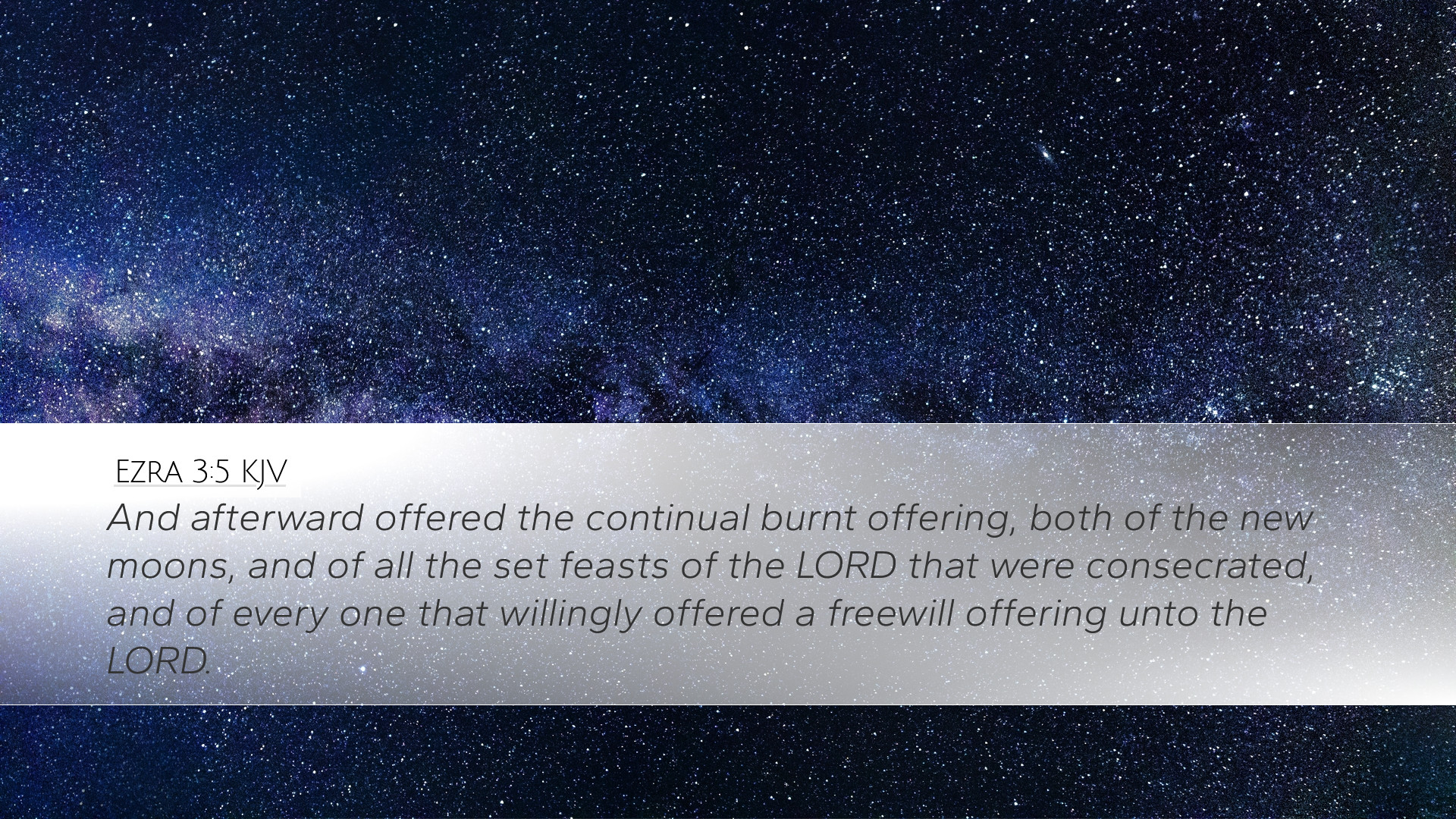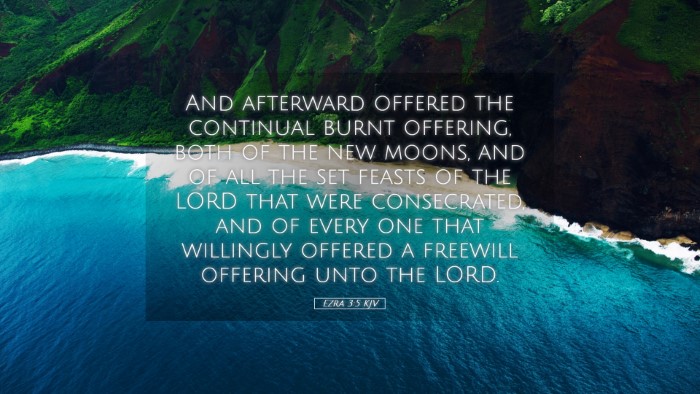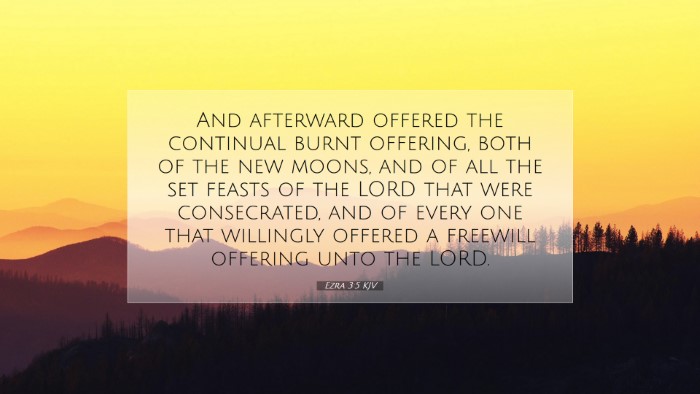Old Testament
Genesis Exodus Leviticus Numbers Deuteronomy Joshua Judges Ruth 1 Samuel 2 Samuel 1 Kings 2 Kings 1 Chronicles 2 Chronicles Ezra Nehemiah Esther Job Psalms Proverbs Ecclesiastes Song of Solomon Isaiah Jeremiah Lamentations Ezekiel Daniel Hosea Joel Amos Obadiah Jonah Micah Nahum Habakkuk Zephaniah Haggai Zechariah MalachiEzra 3:5
Ezra 3:5 KJV
And afterward offered the continual burnt offering, both of the new moons, and of all the set feasts of the LORD that were consecrated, and of every one that willingly offered a freewill offering unto the LORD.
Ezra 3:5 Bible Commentary
Commentary on Ezra 3:5
Ezra 3:5 states: “And afterward offered the continual burnt offering, both of the new moons and of all the set feasts of the LORD that were consecrated, and of every one that willingly offered a freewill offering unto the LORD.” This verse describes the dedication and commitment of the returned exiles in establishing worship after their return to Jerusalem. The act of offering burnt offerings is central to understanding their posture toward God and the significance of worship in their restoration.
Overview and Context
The Book of Ezra chronicles the return of the Jewish exiles from Babylon to rebuild the temple in Jerusalem. This verse falls into the account of the initial steps taken by the returnees to reestablish their religious practices and covenant relationship with God. The restoration of worship served to solidify their identity as God's people and reinstated the essential practices that marked their communal and spiritual life.
Insights from Matthew Henry
Matthew Henry emphasizes the importance of the continual burnt offerings and the revival of worship among the people. He notes that these offerings were essential not just for atonement, but they also represented a staple of worship that anchored the community’s relationship with God. Henry speaks to the psychological and spiritual significance of these acts:
- Worship Restoration: Henry accentuates the fact that the exiles prioritized their covenantal practices, signifying their commitment to God and the restoration of their worship community.
- Freely Offered Heart: The idea of willing and freewill offerings highlights the importance of the intent behind the offerings. It demonstrates a heart-oriented worship approach rather than a mechanical fulfillment of religious duty.
Insights from Albert Barnes
Albert Barnes complements this understanding by detailing the significance of the "set feasts" and their implications for communal identity:
- Liturgical Calendar: Barnes notes that the observance of the new moons and the set feasts was a critical aspect of the Jewish liturgical year and functioned as a means of community cohesion and spiritual rhythm.
- Community Participation: The notion that everyone could participate in freewill offerings indicates an inclusive approach to worship, allowing individuals to contribute personally to the collective relationship with God.
Insights from Adam Clarke
Adam Clarke provides further illumination by focusing on the temple's significance and the spiritual implications of these sacrifices:
- Symbol of God's Presence: Clarke explains that the continual burnt offerings served as a symbol to the people that God was still with them. This reassurance was vital for a people recently displaced from their homeland.
- Restoration and Renewal: Clarke highlights that these offerings signified not only repentance but also renewal and hope for the future, marking the beginning of a new epoch in their spiritual journey.
Theological Reflections
The theological ramifications of Ezra 3:5 are profound and multifaceted:
- God's Faithfulness: The offerings reflect the faithfulness of God to His covenant people and their response to His call to return and restore worship.
- Importance of Sacrifice: The continual burnt offerings remind believers today of the centrality of sacrifice in the life of faith, as ultimately fulfilled in Christ’s ultimate sacrifice.
- Community and Worship: The gathering for offerings underscores the significance of community in worship, inviting modern readers to reflect on their communal practices and relationships with God.
Practical Applications
For pastors, students, theologians, and Bible scholars, several practical applications emerge from this verse:
- Encouragement of Worship: Leaders should encourage communities to express their worship through both individual and collective acts, focusing on the heart’s condition over ritual formality.
- Integration of Tradition and Innovation: While maintaining traditional practices like prayer and offering, communities should also seek new expressions of worship that resonate with current cultural contexts.
- Inclusivity in Worship: Emphasizing voluntary participation in worship can help foster a sense of belonging and ownership in congregations.
Conclusion
In summary, Ezra 3:5 serves as a foundational verse illustrating the importance of worship after a period of exile and loss. The reflections from revered commentators such as Matthew Henry, Albert Barnes, and Adam Clarke reveal rich layers of meaning centered on restoration, community, and the ongoing relationship between God and His people. As contemporary believers reflect on this passage, they are reminded of the enduring call to worship and the significance of returning to the heart of God.


